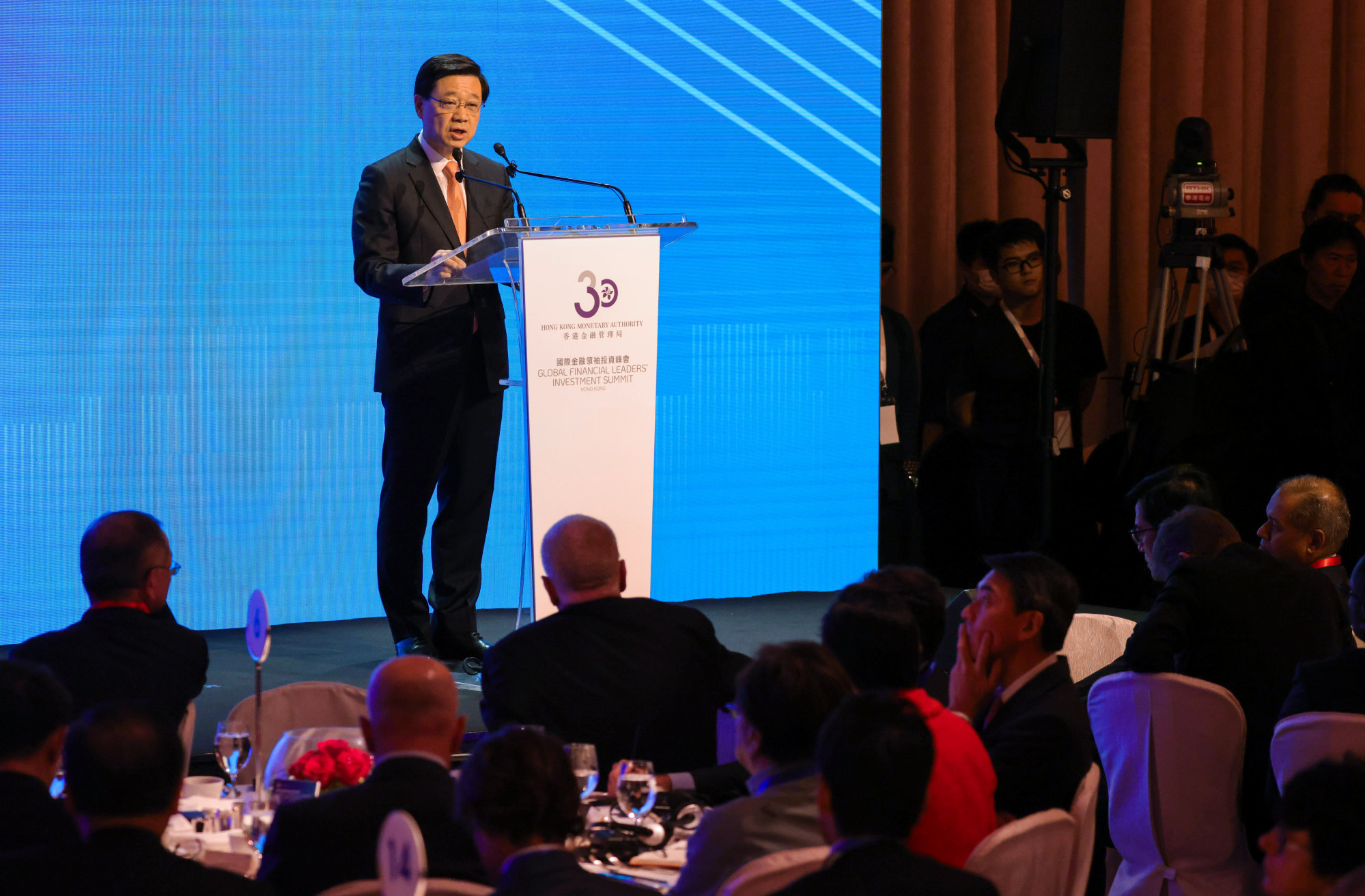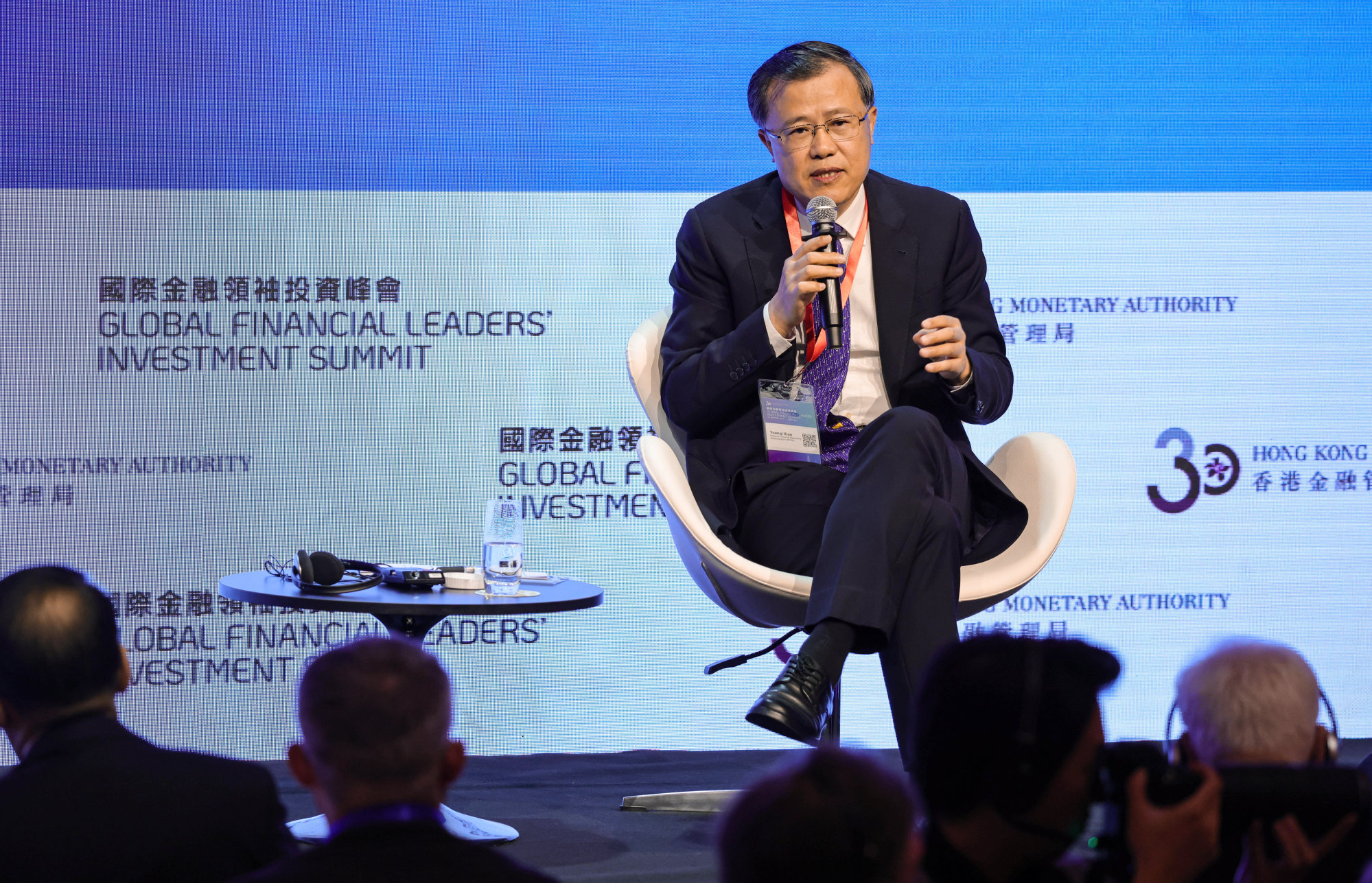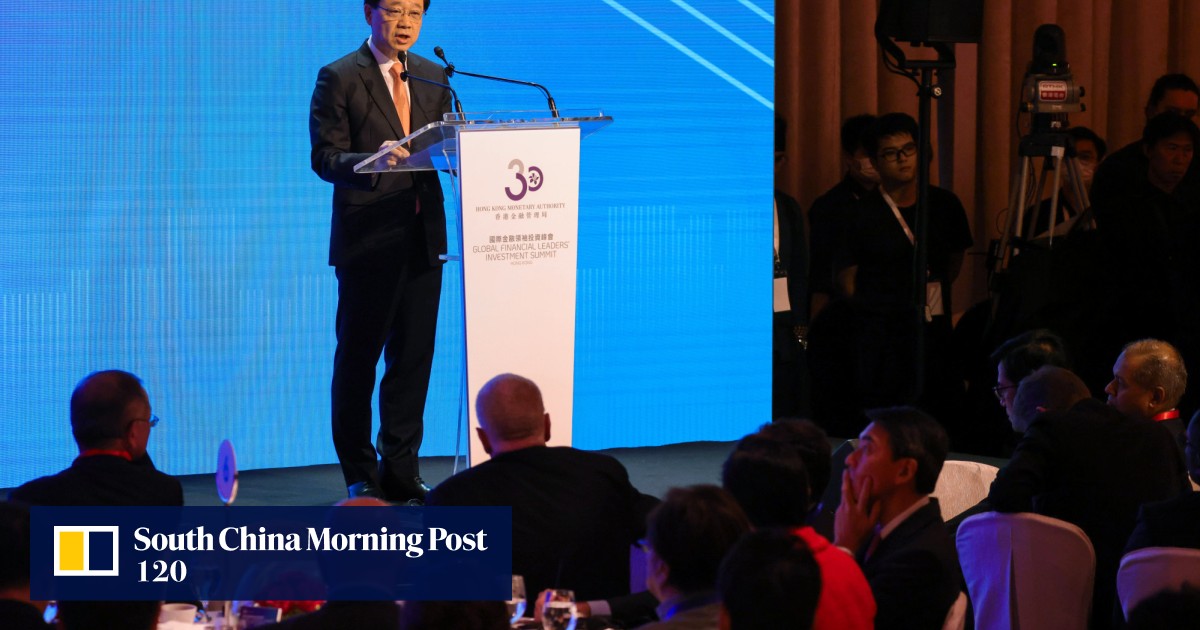“We are at the centre of the world stage, creating opportunities for a world of business, finance and investment,” Lee said. “We continue to deepen our economic and financial ties with [the mainland] and the Greater Bay Area. You will hear a great deal more about it, and the far-reaching opportunities for you at today’s summit and tomorrow’s investment [seminar].”

Wang Jianjun, vice-chairman at China Securities Regulatory Commission said the regulator will “go all out” for anything beneficial to the Hong Kong capital market and that enhances its status.
He said Beijing will continue to promote Hong Kong as an IPO hub and will further expand the connect schemes for cross border stock trading.
“We will make it easier for mainland enterprises to come to list in Hong Kong,” Wang said at a panel discussion.
The CSRC’s support is a boost for the city as listings in Hong Kong in the first nine months of this year, raised the smallest pile of funds in 20 years. A total of 42 companies raised US$3.13 billion on the Hong Kong main board in the period, according to data company Refinitiv.
Funding fell by 65 per cent from a year ago, hitting the lowest nine-month total since the US$1.82 billion trough stuck in 2003 during the severe acute respiratory syndrome outbreak. The city’s ninth-place global ranking in the year to September was down from third place in 2022.

“We will optimise the connect mechanism and promote the inclusion of block trading. We’re talking about the techniques that speed things up, we are working out the details already. We will launch it as soon as possible,” Wang said.
Block trading refers to large sized transactions, usually conducted by institutional investors through wholesale brokers, such as an investment banks to avoid impacting prices adversely on public exchanges.
Wang also said the CSRC would also launch government bond options in Hong Kong and support the newly launched yuan shares counter introduced by the Hong Kong Exchanges and Clearing (HKEX) but did not indicate a timeline as to when mainlanders will be allowed to trade on these counters.
HKEX CEO Nicolas Aguzin has said mainlanders will be able to trade these shares via the stock connect in future.
Dual counter model: why Hong Kong’s latest equity innovation matters to investors
Dual counter model: why Hong Kong’s latest equity innovation matters to investors
In June, the city’s stock exchange operator HKEX allowed trading in yuan-denominated shares of 24 firms with a combined market capitalisation of HK$12 trillion, concurrent with quotations in Hong Kong dollars. The firms include AIA Group, Tencent Holdings, Xiaomi, Meituan and Alibaba Group Holding, which owns the Post. Currently, these shares can only be traded by Hong Kong investors.
The first cross-border connect scheme began in 2014, linking the stock markets of Hong Kong and Shanghai before the addition of the Shenzhen leg two years later. Other investment connect schemes involving swaps, bonds, wealth management and ETFs (exchange traded funds) were added later.
“Hong Kong is back in full swing,” said HKMA chief executive Eddie Yue Wai-man in his keynote address. “The pandemic is behind us, but the complexities and uncertainties are likely to remain.”
The money flow from the wealth management sector from mainland China to Hong Kong this year rose 3 to 4 times from last year after the border reopened earlier this year, according to HSBC CEO Noel Quinn said in a panel of the summit.
“It isn’t all doom and gloom – we have to make the best out of those challenges and look for opportunities,” said Yue, referring to high interest environment, high inflation and ongoing geopolitical tensions.
“Hong Kong is a place to live through complexities – we handled two major financial crisis before and Covid and we will have to count on your support in the years to come.”

“The energy’s is much more different than last year. Last year, we were in the latter part of the COVID. We still have some exceptions, but there was a lot of doubt, many of the global leaders were hesitant to come,” said Sebastian Paredes, CEO at DBS Hong Kong in a video interview with the Post.
“But this year, the attendance is fantastic. Most of the global leaders invited have come to Hong Kong, and we’re beginning to feel re-energized sentiments towards Hong Kong towards China as well.”
“I cannot think of any other place than Hong Kong which is more better place in terms of trade and financial flows into China,” said Norman Chan Tak-lam, former CEO of the HKMA on a special fireside chat along with follow HKMA former leader Joseph Yam Chi-kwong and current HKMA boss Eddie Yue.
It is the ever first time for the three CEOs of the HKMA to speak together at the same panel, as a special way to celebrate the 30th anniversary of the establish of the authority, which was set up in April 1993.
Vice-premier He said that China is the world’s second largest economy with the highest share of economic growth in the world. It will inject fresh and positive energy into the global economic recovery, and Hong Kong will be an important link between mainland and the rest of the world, he added.
“I hope that all you industry leaders from the world’s top financial institutions will speak freely and engage in in-depth exchanges, sharing your insights and exchange ideas so as to provide insights and solutions to address the complex and volatile global macro situation,” said He.





More Stories
The Key to Boosting Retention
Kim Jong Un Unveils Ambitious ‘Regional Development Policy’ To Modernize Rural North Korea Amid Food Shortages
Industry Leader Revolutionizes Business Financing Through Credit Stacking